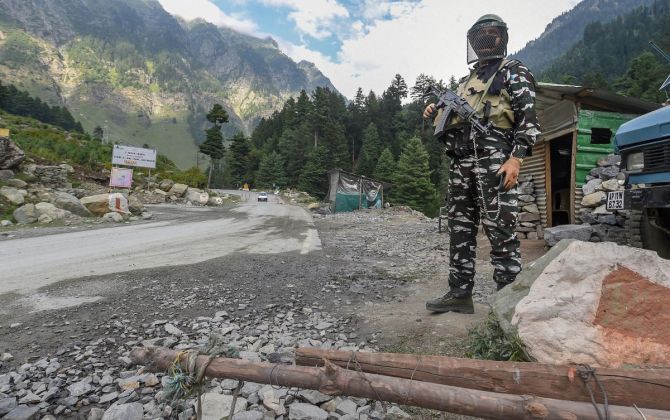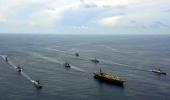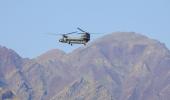India on Thursday said the border tension in Ladakh over the past four months is a 'direct result' of Chinese actions aimed at effecting unilateral change in the status quo of the region, and asserted that the only way forward to resolve it was through negotiations.

The comments by the Ministry of External Affairs(MEA) that squarely put the blame on China for the prolonged border standoff came even as Chief of Defence Staff (CDS) General Bipin Rawat asserted that India's armed forces are capable of handling aggressive Chinese actions in 'best suitable ways'.
Amid a fresh flareup at the Line of Actual Control (LAC), Army Chief Gen M M Naravane began a two-day visit to Ladakh on Thursday to have a first hand look at India's overall combat readiness in the region.
At an online media briefing, MEA Spokesperson Anurag Srivastava said the Chinese actions resulted in 'violation' of the bilateral agreements and protocol which ensured peace and tranquility in the border areas for close to three decades.
He urged the Chinese side to 'sincerely' engage with India with the objective of 'expeditiously' restoring the peace and tranquility in the border areas through complete disengagement and de-escalation in accordance with the bilateral agreements and protocols.
"It is clear that the situation we witnessed over the past four months is a direct result of the actions taken by the Chinese side that sought to effect unilateral change of status quo," he said.
"These actions resulted in violation of the bilateral agreements and protocol which ensured peace and tranquility in the border areas for close to three decades."
Srivastava said the only way ahead now is negotiations, both through the diplomatic and military channels, adding the Indian side is 'firmly committed' to resolving all outstanding issues through peaceful dialogue.
Separately, Gen Rawat said India's armed forces are capable of handling aggressive Chinese actions in "best suitable ways" while pressing for further bolstering the country's military power to expand its regional influence.
"Of late, India has been seeing some aggressive actions by China but we are capable of handling these in the best suitable ways," Gen Rawat said at the online interactive session at the US-India Strategic Partnership Forum.
Tensions flared up again in eastern Ladakh after China unsuccessfully attempted to occupy Indian territory in the southern bank of Pangong lake four days back when the two sides were engaged in diplomatic and military talks to resolve the festering border row.
India occupied a number of strategic heights on the southern bank of Pangong lake and strengthened its presence in Finger 2 and Finger 3 areas in the region to thwart any Chinese actions in the future.
China has strongly objected to India's move. But India has maintained that the heights are on its side of the LAC, according to government sources.
At his briefing, Srivastava also referred to the telephonic conversation between foreign ministers of India and China as well as talks between Special Representatives (SRs) of the two countries on boundary questions after the border row erupted.
"We reiterate the consensus reached between the two foreign ministers and SRs that the situation in the border should be handled in a responsible manner and either side should not take any provocative action or escalate matters," he said.
On Monday, the Indian Army said the Chinese military carried out 'provocative military movements' to 'unilaterally' change the status quo on the southern bank of Pangong lake on the intervening night of August 29 and 30 but the attempt was thwarted by the Indian troops.
Srivastava on Tuesday said the Chinese People's Liberation Army (PLA) was engaged in 'provocative action' again a day earlier when the ground commanders of the two sides were holding talks to ease the situation.
On the first day of his visit to Ladakh, Gen Naravane visited a forward location and interacted with all top commanders tasked to oversee India's combat readiness in the region.
The Indian Army made 'readjustments' in deployment of troops in the region following the fresh attempts by China to change the status quo.
In his address, Gen Rawat also said that India is monitoring China's infrastructure building in Tibet, development of strategic railway lines and changes being made by it in its military structures.
He also said that India's policy of engagement with countries of the region, if not backed by credible military power and regional influence, would imply acknowledging China's preeminence in the region.
"If our policy of engagement, if not backed by credible military power and regional influence, would imply acknowledging China's preeminence and influence in the subcontinent and the Indian Ocean region. Our strategic autonomy has to be further strengthened with like-minded regional powers," he added.










